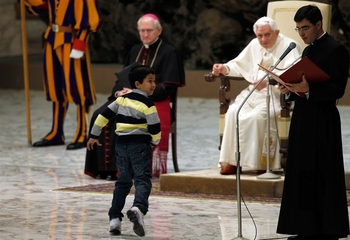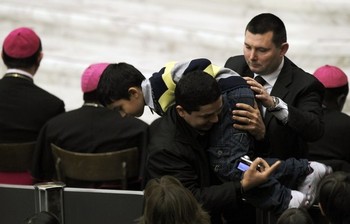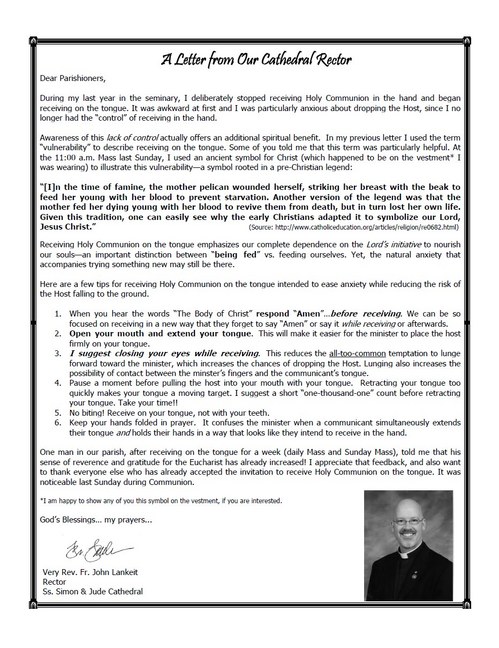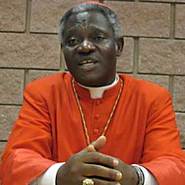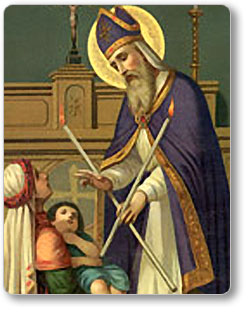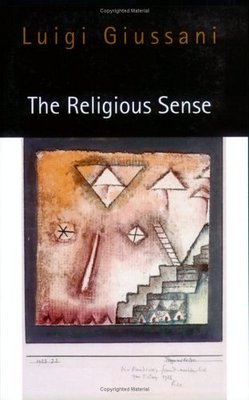 This coming year the Schools of Community throughout the world will be working on Monsignor Luigi Giussani’s seminal text, The Religious Sense (in English in 1997).
This coming year the Schools of Community throughout the world will be working on Monsignor Luigi Giussani’s seminal text, The Religious Sense (in English in 1997).
Focolare saved a vocation and formed a man of God
Carol Glatz of CNS wrote a fascinating article –at least fascinating to me because I can identify with what the new Prefect of the Congregation of Religious said of his own experience with Liberation Theology. To say that liberation theology terrorized vocations is likely an understatement. I believe the Archbishop is correct in saying that elements of liberation theology are credible, Pope Benedict has said as much, too, but the Marxist methodology is not fitting for the salvation of souls, at least how the Church conceives of salvation of souls. Liberation theology deconstructed religious and priestly life to social work, reduced essential theological concepts to ideology and rejected the authority as non-essential, among many things. Why would anyone devote their lives to a religious vocation under the rubric of liberation theology? Clearly this method of theological reflection needs to be scrutinized even more.
Saint Rabanus Maurus
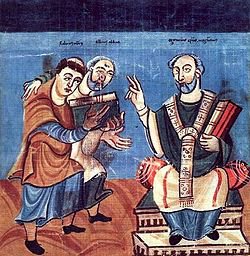 Saint Rabanus (c. 780-4 Feb. 856), a Benedictine monk, theologian, exegete, poet, abbot and archbishop of Mainz, called the “teacher of Germany.” Rabanus studied under Alcuin who gave him the name of “Maurus.” He authored De rerurm naturis (On the Nature of Things), De laudibus sanctae Crucis but he’s most known for his composition of “Veni Creator Spiritus,” the beautiful hymn we sing at Pentecost and any time we pray to the Holy Spirit.
Saint Rabanus (c. 780-4 Feb. 856), a Benedictine monk, theologian, exegete, poet, abbot and archbishop of Mainz, called the “teacher of Germany.” Rabanus studied under Alcuin who gave him the name of “Maurus.” He authored De rerurm naturis (On the Nature of Things), De laudibus sanctae Crucis but he’s most known for his composition of “Veni Creator Spiritus,” the beautiful hymn we sing at Pentecost and any time we pray to the Holy Spirit.
St Agatha’s Mass and Anointing of the Sick for those living with breast cancer, East Haven
We will be gathering to pray the Holy Mass for those living with breast cancer in honor of Saint Agatha, the patron saint of those living with breast cancer.
Saint Agatha’s feast day is February 5 but for pastoral reasons, the liturgical observance will be held on the day before and the after the feast.
No one is without a family member or a friend who has breast cancer.
This is an opportunity to join together in prayer and friendship with those living with ongoing trial –you could say cross– of breast
cancer.
On Friday, February 4, 2011, at the 5:30 pm Mass at Our Lady of Pompeii Church (355 Foxon Road, Route 80, East Haven, CT), Father John Lavorgna will administer the Sacrament of the Anointing of the Sick invoking the intercession of Saint Agatha.
Let your friends know of this special Mass and anointing service. All are invited and most welcome.
Pope and his small unexpected visitor
Four Chaplains Day
Besides being Saint Blase Day, today is also known as “Four
Chaplains Day.” The US Congress designated today to honor the 4 US Army chaplains who
were serving on the USAT Dorchester during World War II.
Father John P. Washington
(Roman Catholic priest), Rev. Clark V. Poling (Dutch reformed), Rev. George L. Fox
(Methodist), and Rabbi Alexander D. Goode sacrificed their lives as their ship
went down. 672 of 902 men died.
All of the chaplains held the rank of lieutenant.
The Episcopal Church has designated February 3 a liturgical memorial for these chaplains.
Nancy Davis killed by drug smugglers for her truck
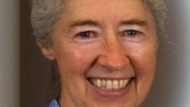 Last week Nancy Davis, 59, drug smugglers wanted her pickup truck and killed her for it in Mexico. What Nancy and her husband, Sam, did was to build churches and orphanages but they found themselves trying to out-run drug runners with assault rifles. Nancy and Sam Davis have been missionaries in Mexico for the last 38 years.
Last week Nancy Davis, 59, drug smugglers wanted her pickup truck and killed her for it in Mexico. What Nancy and her husband, Sam, did was to build churches and orphanages but they found themselves trying to out-run drug runners with assault rifles. Nancy and Sam Davis have been missionaries in Mexico for the last 38 years.
Reception of Holy Communion –a pastor’s lead
Prayer, Doctrine, Life and Evangelization: are we coherent?
In weekly classes on the Catholic I’ve been stressing a few (of many) points:
- lex orandi, lex credendi, lex vivendi (prayer, doctrine, life): all have to cohere
- the Incarnation is a fact: in faith we encounter this fact, this Person, experience the exceptionality and the wonder
- the contemporaneousness of Jesus Christ
- the witness of the Catholic faith is true and it is true for all people
Saint Blase and the Blessing of Throats
Lord, hear the prayers of Your martyr Blase. Give us the joy of Your peace in this life and help us to gain the happiness that will never end.
The Church has few exact details of the life of Saint Blase (also Blaise, Biago, Sveti Vlaho) but we have the experience of his popularity through the centuries in the churches of the East and West. What we know is that Blase was a physician, the Bishop of Sebaste, Armenia and martyr. The Roman Martyrology tells us that he was beheaded in 316.
More info on Saint Blase is found here and here.
The Blessing of Candles on the feast of St Blase can be found here.
The Blessing of Bread, Wine, Water and Fruit for the feast.
From the Golden Legend again:
And when this good widow, which by S. Blase had recovered her swine, heard thereof, she slew it, and the head and the feet with a little bread and a candle, she brought to S. Blase, and he thanked God and ate thereof, and he said to her that every year she should offer in his church a candle, and know thou that to thee and to all them that so shall do shall well happen to them, and so she did all her life, and she had much great prosperity.
Even after imprisonment, he refused to worship the prince’s gods, and for punishment his flesh torn by wool combs. He was finally beheaded, martyred along with seven women and two children.
Today, due to the cure of the boy’s throat when the boy was choking, Saint Blase is patron against diseases or any other trouble of the throat.
The priest will bless two candles in honor of Saint Blase.


